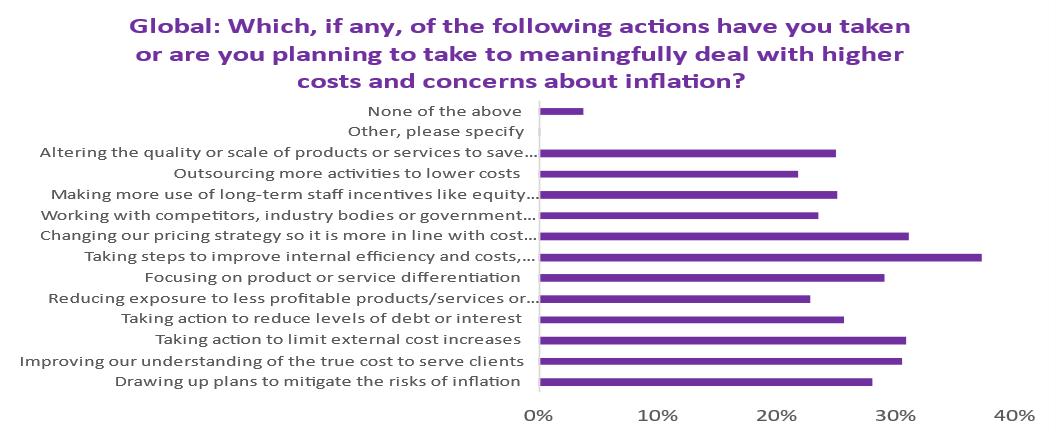-
International Financial Reporting Advisory Services
IFRS reporting advisory serivces of Grant Thornton are carried out by our dedicated team with expertise in IFRS implementation.
-
Audit Services
• Statutory audit • Review of financial statements and financial information • Agreed-upon procedures • FRAS services • Compilation of financial information • Reporting accountant • Cross-border audit • US GAAP audit
-
Audit Quality
We have various methods of monitoring our system of quality control and engagement quality, including real-time involvement of coaches and national office personnel on select audit engagements, reviews of issuer audit engagements prior to archiving by someone outside of the engagement team, and internal inspections of assurance engagements and the system of quality control.
-
Audit Approach
Audit Approach
-
Licensing services
Licensing services
-
International tax planning
Our extensive international network provides us with significant resources to meet all your expansion goals. We strive to develop commercially focused and tailored tax strategies to minimise tax exposures and maximise business efficiency.
-
Expatriate tax planning
We have a broad knowledge base and skills to assist you keep your personal income taxes to a legitimate and reasonable level, while remaining compliant with legislation. We can develop a personalised package for each key employee to take maximum advantage of the exemptions and incentives available.
-
Tax advisory
We will review the proposed business model and transactions and advise on tax implications and recommendations to optimize the tax opportunities under the local regulations and treaties which Vietnam entered into. Furthermore, we coordinate with our GT global tax team to provide a comprehensive tax advisory for the countries involved in the business model and transactions.
-
Tax compliance services
This service is designed to assist enterprises to cope with the statutory tax declaration requirements in line with the Vietnamese tax laws as well as the frequent changes and updates in tax laws.
-
Tax health check
Our Tax Health Check involves a high-level review of specific tax areas to highlight the key issues that need to be rectified in order to reduce tax risks. Through our extensive experience, we have identified key risk areas in which many enterprises are not fully compliant or often overlook potential tax planning opportunities. Our tax health check service represents a cost-effective method to proactively manage risks and reduce potential issues arising as a result of a tax inspection.
-
Transfer Pricing
Transfer pricing is a pervasive tax issue among multinational companies. In Vietnam, the tax authorities require special documentation to report related party transactions. Compliance with transfer pricing regulations is an important aspect of doing business effectively in Vietnam as failure to do so may result in significant penalties.
-
Tax due diligence
We conduct tax due diligence reviews of target companies to analyse their tax exposure and position in relation to acquisitions, mergers or consolidations. We are able to integrate this service with our Advisory Services department in order to offer a comprehensive, holistic due diligence review.
-
Customs and international trade
Our experienced professionals can help you manage customs issues more effectively through valuation planning and making use of available free trade agreements. We also assist Clients in optimising their customs procedures by making use of potential duty exemptions and efficient import-export structures. Risk mitigation activities include customs audit defense and compliance reviews.
-
M&A Transaction
We advise numerous foreign investors on efficient tax structures for their investments. Our experience allows you to consider all the options and set up a corporate structure that meets both operational and tax efficiency requirements. In short, the structure that is best for you.
-
Industrial Zones – Picking A Location For Your Business
Grant Thornton Vietnam’s one-stop services are designed to provide comprehensive support to both new and current investors who are planning to expand or restructure their business in Vietnam. Our professionals have established strong working relationships with landlords, property developers and authorities at various localities. With extensive experiences in liaison with the relevant agencies, we offer assistance including negotiation on land rental rates and efficient management of licensing process. Our customized and flexible solutions can bring benefits of cost efficient location, accelerate licensing process, and optimize tax opportunities while remaining in compliance with legislation.
-
Tax Audit Support
Tax audit support services provide comprehensive assistance to your business in Vietnam. Recent tax practices have shown the general tendency of launching routine tax audit on yearly basis. Tax authorities have been effectively using more sophisticated methods to identify target entities from across different industry sectors.
-
Business Risk Services
Business Risk Services
-
Transaction Advisory Services
Transaction Advisory Services
-
Valuation
Valuation
-
Business consulting services
Finance Management Advisory
-
Accounting services
Accounting services
-
Taxes compliance within outsourcing
Taxes compliance within outsourcing
-
Payroll, personal income tax and labor compliance
Payroll, personal income tax and labor compliance
-
Secondments/Loan staff services
Secondments/Loan staff services
-
Compilation of the financial and non-financial information
Compilation of the financial and non-financial information
-
Accounting systems review and improvement
Accounting systems review and improvement
-
Initial setting-up for accounting and taxes systems
Initial setting-up for accounting and taxes systems
-
Management accounting and analysis
Management accounting and analysis
-
Comprehensive ERP system solution
ERP software is a tool for business operations, production management, order processing and inventory in the business process. Today, ERP software for small and medium businesses has been greatly improved to help businesses manage their business better. The article below will answer all relevant information about what ERP software is and offer the most suitable ERP solution for businesses. Let's follow along!
-
Analyze Business Administration data
We believe in the value that data can bring to the success and development of every business. Our team helps design data architecture supported by tools, to support business governance and provide useful information to management.
-
Financial reporting compliance solution package
Putting financial issues at the heart, this service helps ensure that financial reports for customers comply with both the requirements of Vietnamese accounting regulations and standards (VAS) as well as reporting standards. international finance (IFRS).
-
Third-party ERP extensions
ERP is a long-term solution that requires long-term travel, not short-term. We understand that many businesses cannot deploy the entire ERP system at once due to many different reasons, instead businesses can deploy each part. Over time, these solutions can be expanded to accommodate improved business processes or can even link completely new processes across different departments.
-
Localize, deploy and rebuild the project
Quite a few ERP projects need to be implemented according to current Vietnamese requirements and regulations, but still comply with common international business requirements. These projects need some improvements and adjustments in the right direction.
-
Consulting on technology solutions
We support the selection and implementation of the most suitable solutions, ensuring business efficiency and performance. We will work closely with customers to plan, evaluate and implement the right technology investment strategies and solutions to meet the development needs of businesses.

-
Offshore company establishment service
Using the offshore company model will facilitate the owner in the process of transaction and expand overseas markets, take advantage of the tax policy with many incentives and protect the value of the family enterprise's assets.
-
Private Trust Advisory
The development of the economy with many modern financial instruments has brought many advantages and opportunities for the enterprises, but there are still certain potential risks in any type of business. So how to protect your asset value with an appropriate company structure while stay compliance with relevant regulations?
-
Our values
We have six CLEARR values that underpin our culture and are embedded in everything we do.
-
Learning & development
At Grant Thornton we believe learning and development opportunities help to unlock your potential for growth, allowing you to be at your best every day. And when you are at your best, we are the best at serving our clients
-
Global talent mobility
One of the biggest attractions of a career with Grant Thornton is the opportunity to work on cross-border projects all over the world.
-
Diversity
Diversity helps us meet the demands of a changing world. We value the fact that our people come from all walks of life and that this diversity of experience and perspective makes our organisation stronger as a result.
-
Contact us
Contact us
-
Available positions
Experienced hires
-
Available positions
Available positions
The latest Grant Thornton International Business report findings globally show that overall business health has declined, as expected in line with the weakening economic outlook, with reduced forecasts in economic growth for most, if not all major economies. Nguyen Chi Trung Managing Partner of Grant Thornton Vietnam said “rising interest rates in most developed economies to fight the rising inflation, which is expected to surpass 10% in the UK and USA and some other developed countries, are also driving the global slowdown and reduced economic growth”.
Rising energy costs and falling optimism are the most notable trends in the survey for the H1 2022, Rising energy costs and wage increases are feeding through to higher selling prices however most respondents to the survey are protecting margins by increasing selling prices in line with cost increase or increasing prices more that the increase in costs, meaning that profit expectations remain strong against a backdrop of weakening global trade.
In spite of the weakening global trade many of the respondents to the survey retain strong export expectations for their businesses.

When asked what actions have been taken or are planned to meaningfully deal with higher costs and concerns about inflation the most common answer from approximately 40% of respondents was “taking steps to improve internal efficiency and costs”. The second highest response was changing pricing strategy to be more in line with costs.
Optimism prevailed in Vietnam gaining the number 1 spot globally across 28 countries surveyed with 88% of respondents being slightly or very optimistic, 12 percentage points higher than Indonesia, which ranked number 2 in ASEAN. The percentage for Vietnam was 8 percentage points higher than H2 2021. This is no doubt helped by the current indicators which show that Vietnam should maintain inflation at under 4% projected GDP growth of 7% or more, continued export growth in spite of headwinds) and continued growth in FDI.
Vietnam also gained top spot in expectations for exports with 80% of respondents forecasting a growth, up 15 percentage points from h2 2021. There was also another first when asked about profitability with Vietnam leading the rankings with 87% of respondents forecasting an increase in profits in 2022.
In spite of the optimism 71% of respondents expressed slight or major concern about inflation impacting raw material or other operating costs. However, it seems that they are expecting to be able to pass these additional costs onto customers.
When asked about the impact of the Russia – Ukraine situation 46% of Vietnamese respondents expressed concern that this would lead to higher costs, 44% to supply chain interruption and 35% to loss of new business opportunities.
In response to our specific question for Vietnamese companies as to whether they were implementing ESG policies to better prepare for borrowing and or capital raising the majority of 68% answered in the affirmative, highlighting the importance of this subject now being focused on by lenders and investors.
The final specific question for Vietnamese companies was whether or not they were preparing for a switch from VAS to IFRS in 2025 and 58% replied in the affirmative. Considering the survey is targeted at SME’s this response was very encouraging as it means Vietnamese companies are planning ahead on such issues.
In summary the responses seem to align with the expectations that Vietnam will achieve one of the world’s highest growth rates in 2022 with GDP growth in a range of 7 to 7.5% and a further strong growth in 2023, although this is harder to predict with slowdown expected in some of Vietnam’s major export markets. Vietnam will for sure be able to cap inflation no higher than 4% in 2022 and as Vietnam is net food exporter they are somewhat insulated against food price inflation. Energy prices have been maintained at a constant prices except for petroleum products but these have fallen significantly in recent weeks. New FDI will continue to be a key driver for growth as will the growth of the middle class.



